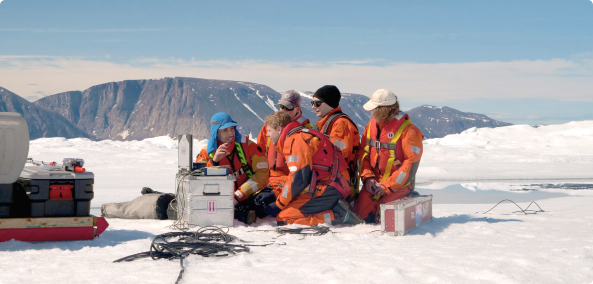8th Arctic Futures Symposium diverse mix of Arctic voices

According to participants and members of the organising committee, the 8th Annual Arctic Futures Symposium held on Monday November 20th was a major success any way you measured it. The symposium provided a public platform to a very diverse group of Arctic stakeholoders to voice their conerns, identify challenges, debate solutions, and promote their initatives in the EU's capital. Nearly 200 participants turned up to the Residence Palace in Brussels’ EU Quarter to hear what more than 40 Arctic stakeholders had to say.
With a focus on smart and sustainable investment in the Arctic, the 2017 edition of the symposium saw strong participation from representatives from Arctic indigenous communities, the EU, local and regional governments in the Arctic, researchers and academics, industry representatives, and entrepreneurs.
Presided by Mikael Janson, Director of the North Sweden European Office in Brussels, the symposium opened with welcome remarks on behalf of the International Polar Foundation from former Belgian Ambassador to Vietnam and member of the Belgian Polar Secretariat, Piet Steel.
Following Ambassador Steel's welcome speech, the symposium saw speeches from three keynote speakers: Director-General of the European Commission’s Directorate General for Maritime Affairs and Fisheries João Aguiar Machado, Advisor to the Inuit Circumpolar Council and former Premier of Greenland Kuupik Kleist, and the Government of Québec’s new Envoy for Climate Change, Northern and Arctic Affairs Jean Lemire. All three speakers offered unique and important perspectives on smart investment and development for a sustainable Arctic - investment and development that must respect the region’s indigenous traditions and avoid causing harm to the region's unique environment.
The remainder of the day included discussions focused on a wide range of issues, such as:
- The EU's engagement with the Arctic Council, which featured the EU’s new Ambassador at Large for the Arctic Marie-Anne Coninsx, Saami Council President Åsa Larsson Blind, and Senior Arctic Officials from Arctic Council nations
- The future of Arctic research cooperation, with International Arctic Science Committee President Susan Barr, World Meteorological Organization Secretary-General Petteri Taalas, and other distinguished researchers
- Reducing the environmental impact of the extractive industries and measuring sustainability in Arctic communities, with contributions from the oil and gas industry, mining, and academics studying Arctic sustainability such as Katherine Weingartner from the George Washington University
- Meeting the educational needs of Arctic residents and fostering Arctic entrepreneurship, with representatives including Saami Council EU Coordinator Elle Merete Omma, the Mayor of Tromsø Kirstin Roymø, Former Assistant Governor of the Danish National Bank Anders Møller Christensen, and others
- The Arctic bioeconomy as a solution to sustainable development in the region, which featured presentations focusing on fisheries, forestry, innovation, and entrepreneurs such as Ulrik Lyberth, who started his own seaweed cultivation and production company in Greenland, and innovator Stephen Mooney from the Yukon Resaerch Centre.
The symposium closed with remarks from Deputy Secretary General for Economic and Global Issues at the European External Action Service Christian Leffler, who reflected on the salient points discussed during the day, and thanked the International Polar Foundation for its initiative in establishing the symposium as an annual event.
Some of the more salient points brought up at the 8th annual Arctc Futures Symposium inlcude:
- There has been a lot of talk about a taking a more holistic approach to Arctic research that integrates natural science, social science, and indigenous traditional knowledge, but it is necessary to find more ways to put this holistic approach into action
- Many industries operating in the Arctic are working on ways to reduce their environmental footprint; environmental protection and growth are not mutually exclusive ideas
- Education is key to improving the job prospects of Arctic residents, helping to ensure that Arctic residents have good jobs and want to stay in the Arctic to live and work
- Arctic indigenous peoples have great experience as entrepreurs of small and medium-sized enterprises, but many do not feel the need to grow their enterprises too large so that they are no longer sustainable
- The Arctic bioeconomy - which includes fishereis, forestry, biomass fuels, and agricultrue - provides important sustainable growth and job solutions for the Arctic
A partnership between the International Polar Foundation and the Nordic Regional Offices, Embassies and Missions in Brussels, and private organisations involved in Arctic issues, the Arctic Futures Symposium is held every autumn in Brussels order to Arctic voices to be heard in the capital of the EU.
The International Polar Foundation would like to thank all of the speakers and moderators who took the time out of their busy schedules to offer their knowledge and expertise to the event, as well as all partner organisations, including:
- The Brussels Capital Region for its financial support
- The Permanent Representation of Finland to the European Union
- The Mission of Canada to the European Union
- The North Norway European Office
- The North Sweden European Office
- The East and North Finland EU Office
- The Greenland Representation to the European Union
- The Mission of Iceland to the European Union
- The Québec Government Office in Brussels
- The Mission of the Faroes to the European Union
- Arctic Consensus
- Sæmark and Iceland Responsible Fisheries for providing the delicious fresh Icelandic fish enjoyed at lunch!
We are also grateful to all participants who took part in the event and engaged all the speakers with their thoughtful questions.
We hope to see everyone agian next year!
Download





















